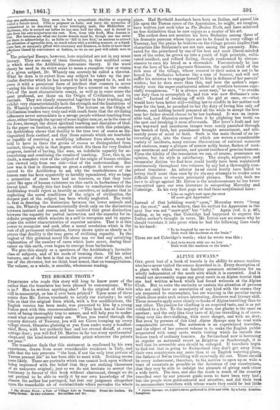THE BROKEN TROTH.* EvEnrimer who reads this story will long
to know more of the author than the translator has been pleased to communicate. Who is he ? Has he written anything else ? Is the original of this tale still in manuscript, or has it ever been printed? Upon none of these points does Mr. Ireton vouchsafe to satisfy our curiosity ; he only tells us that the original from which, with a few modifications, the English version has been made, was presented to him by a young Italian poet with this recommendation: " This book has at least the merit of being thoroughly true to nature, and will help you to under- stand what our peasantry really are. When you travel through the country districts of Tuscany, you will see Cecco lounging up every village street, Giannina glancing at you from under many a handker- chief, Rosa, with her motherly face and her eternal distaff, at every cottage door; you will find Dr. Matteo in far too many apothecaries' shops,and the kind-hearted sententious priest wherever the priests are poor." The translator finds that this statement is confirmed by his own experience, drawn from some considerable residence in Italy, and adds that the tale presents " the best, if not the only true picture of Tuscan peasant life" he has been able to meet with. Nothing seems more likely. There are portraits which one cannot look upon without being impressed with the belief that they are striking likenesses of an unknown original; just so we do not hesitate to accept the testimony in favour of this book without abatement, though we do not pretend to be able to verify it by our own knowledge of the classes the author has portrayed, but rest our judgment altogether upon the remarkable air of verisimilitude which pervades the whole
*. The Broken Troth Tale of Village Life in Tuscany. From the Italian. By Philip Ireton. In two volumes. Macmillan and Co.
piece. Had Berthold Auerbach been born an Italian, and passed his life upon the Tuscan spurs of the Appennines, lie might, we imagine, have written just such tales as The Broken Troth, and have achieved no less distinction than he now enjoys as a master of his art.
The author does not mention his hero Stefanino among those of his dramatis persona: whose types are to be found in every village of Tuscany, but the praise he bestows on the village priests implies that characters like Stefanino's are not rare among the peasantry. Edu- cated for the priesthood by one of the best and most liberal-minded men of the order, he grows up into a youth of high principle, culti- vated intellect, and refined feeling, though condemned by circum- stances to earn his bread as a shoemaker. Unconsciously he has won the love of his old playmate Giannina, the spoiled child of the rich man of the village, whose consent to their union is not to be hoped for. Stefanino behaves like a man of honour, and will not suffer his mistress to engage herself to him in defiance of her parents' wishes; but lie does more than this, and here the author's supe- riority over the super-sentimental school of novelists becomes espe- cially conspicuous. " It is always snore easy," he says, " to overdo our duty than to accomplish it, and this was now Stefanino's mis- take." Instead of breaking off with the girl at once, or—what would have been better still—telling her to confide in her mother and hope for the best, he preached to her the duty of loving him only ad' interim, and holding herself prepared all the while to accept the first man her father should choose to be her husband. It was an impos- sible task, and Giannina escaped from it by plighting her troth on the spot and breaking it soon afterwards.. Her lover's fault and her own wayward and impetuous temper were sorely punished through her breach of faith, but punishment brought amendment, and ulti- mately peace of mind to both. • Such is the main thread of an in- teresting plot, into the tissue of which are woven a considerable variety of incidents, many curious illustrations of national manners and customs, many a glimpse of sorrow nobly borne, flashes of mad- cap merriment and adventure, and quaint touches of genuine humour.. Upon the fidelity of the translation we can, of course, pronounce no opinion, but its style is satisfactory. The simple, expressive, and vernacular diction we find here could hardly have been maintained continuously throughout two volumes by any but a thoroughly com- petent translator. An inferior hand could hardly have failed to betray itself more than once by its clumsy attempts to render some difficult idioms or obscure provincial phrases.. The only fault we have to allege against Mr. Ireton is the misdemeanours lie has twice committed upon our own literature in misquotins. Macaulay and Coleridge. In his very first page we find these unrythmical lines:
" Like an eagle's nest upon the crest Of snow-girt Appennme."
Instead of that hobbling wordi" upon," Macaulay wrote "hung on the crest," and, we believe, that his epithet for Appennine in the next line was not "snow-girt" but "lofty." Again (vol. ii. p. 46), finding, as he says, that Coleridge had happened to express the Italian author's thought in verse, Mr. Ireton saw no reason why he should translate it into prose when he had the following lines ready to his hand:
" To be despised by one we love Doth work like madness on the brain."
These are not Coleridge's words ; what he wrote was this :
" And to be wroth with one we love' Doth work like madness on the brain."






























 Previous page
Previous page